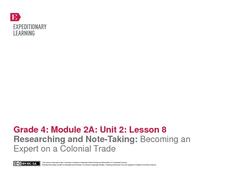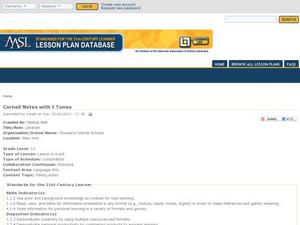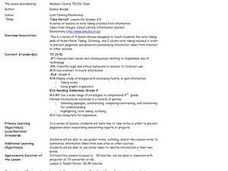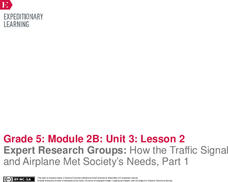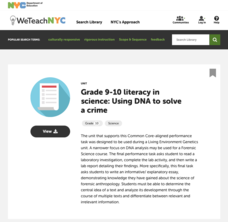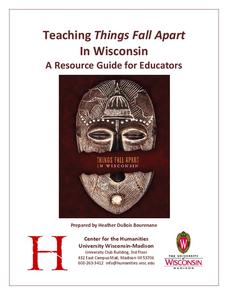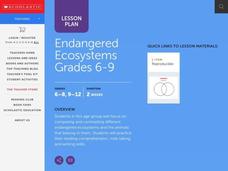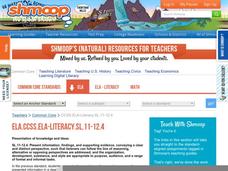EngageNY
Reading and Taking Notes on Colonial Trades
In the tenth instructional activity of this unit, young scholars learn to categorize information as they continue researching their colonial trade. During guided practice, the teacher models how to read informational text slowly while...
EngageNY
Listening Closely and Taking Notes: Colonial Trade Podcast About the Wheelwright
Voices from the past. Young scholars listen to a podcast interview with a historical re-enactor as they continue their research in the eleventh instructional activity of this unit on colonial trade. Applying their close reading skills,...
EngageNY
Listening Closely and Taking Notes in Expert Groups: Colonial Trade Podcast
The twelfth instructional activity of this unit builds on the skills developed in the previous instructional activity, as fourth graders continue their quest to become experts on colonial trade by listening to interviews with historical...
Curated OER
Pizza Biography
A biography writing lesson plan with a tasty twist! Kids create a "visual biography" in which each pizza slice represents a paragraph, and toppings represent supporting details. They learn research techniques, note-taking skills, and how...
EngageNY
Researching and Note-Taking: Becoming an Expert on a Colonial Trade
Fourth graders work in small groups to become experts on different colonial trades in the eighth instructional activity of this unit. Working toward the long-term goal of writing a piece of historical fiction, young scholars read...
EngageNY
Mid-Unit Assessment: On-Demand Note-taking and Text-Dependent Questions
Flex those brain muscles! Scholars take a mid-unit assessment, conducting research to take notes about how a particular invention helped meet society's needs. To complete the test, they work on draft sketches for their graphic novelettes.
Curated OER
Cornell Notes with I Tunes
Note taking is an invaluable skill and requires practice. This lesson incorporates the Cornell Notes format, however the plan itself could be implemented to teach any style. The basic idea here is to use university lectures on podcasts...
Curated OER
Take Note2!
Learners practice the note-taking skills of Pocket Note Taking, Outlining, and 2 column note taking. They use pocket notes, outlining, and/or two-column notes to summarize information taken from web sites or other sources. Afterward,...
EngageNY
Close Reading of Bullfrog at Magnolia Circle: Main Ideas about the Bullfrog
As your class reaches the end of the book Bullfrog at Magnolia Circle, the seventh lesson in this literary unit helps third graders transition from reading narrative to expository writing. Scholars develop their note-taking skills as...
Curated OER
Summarizing
Pupils use their note-taking skills to write summaries of information. In this writing skills lesson, students use the notes they have taken in another lesson to write adventure stories by implementing the Rule-Based strategy.
C-SPAN
Choice Board - Conversations with Suffragists
Celebrate 100 years of women's suffrage by planning a re-enactment of famous women discussing their fight. After learners view a series of interviews with famous women played by actors, including Susan B. Anthony, Sojourner Truth, and...
Curated OER
Information Reports
Students practice essay skills. In this essay skills lesson, students select an essay subject and take notes for their topic. Students create a web for their essays. Students organize, write, revise, and publish their essays.
EngageNY
Expert Research Groups: How the Traffic Signal and Airplane Met Society’s Needs, Part 1
Where would society be without the TV? Working together, scholars complete an anchor chart about the invention of the television. Additionally, pupils complete vocabulary cards for key terms from the unit and organize them on a metal ring.
New York City Department of Education
Grade 9-10 Literacy in Science: Using DNA to Solve a Crime
Scholars become detectives and use science to solve a crime! A complete unit introduces DNA and includes hands-on activities that have learners model DNA and extract it from different food types. A culminating activity challenges...
Curated OER
Note Taking And Skills And Lab Reports
Students perform simple and fun experiments to use the scientific method, take careful notes, and write a lab report. They first make and test a hypothesis about how many drops of water they can fit on the face of a penny and then test...
University of Wisconsin
Teaching Things Fall Apart in Wisconsin: A Resource Guide for Educators
“There is no story that is not true, . . .” And uncovering the truths in Things Fall Apart is the focus of a 68-page resource packet designed to provide instructors with a wealth of materials that enhance understanding of Chinua Achebe’s...
Curated OER
Endangered Ecosystems
Reading comprehension and note-taking skills are practiced as young ecologists embark on this journey. Explorers visit a website where they will read about three ecosystems that are in danger. They use interactive programs to build a...
EngageNY
End of Unit 2 Assessment: Working with Two Texts - Reading, Listening, Summarizing, and Synthesizing
As a summative assessment for this unit on colonial trade, fourth graders listen to and read informational texts in order to demonstrate their ability to take notes, write summaries, and draw connections. Young scholars first listen as...
Scholastic
Pilgrim and Wampanoag Daily Life for Grades 6–8
Two slide shows, viewed side-by-side, permit middle schoolers to compare and contrast the lives of the Pilgrims of the Plimoth colony and the Wampanoags. Four videos take learners on virtual field trips to the Plymouth plantation. And an...
EngageNY
Applying Research Skills: “Rachel Carson: Environmentalist and Writer”
It's important to cite sources! Scholars take a closer look at their research about DDT by examining how to cite sources. Learners take turns sharing information that would be used to cite sources to complement Rachel Carson:...
Curated OER
Take Your Time
Your class examines the ways that they spend time by evaluating their own schedules. They create a peer research survey to gather information about their various habits. They analyze the data and compare/contrast the activities of...
Curated OER
Good for Goodness Sake?
After discussing their opinions of performing community service, young learners read an article about different benefits of serving the community. They participate in a debate about whether their school should require pupils to perform...
Curated OER
Literary Skills
Develop their literary skills. In this literature lesson, students collaborate to read portions of books and examine settings, plots, main ideas, and conclusions.
Shmoop
ELA.CCSS.ELA-Literacy.SL.11-12.4
Study allusions with a research and presentation project. Pupils are assigned a specific allusion, the phoenix for example. They research the origins, compose a summary, explain the concept, and explore this allusion within various...






